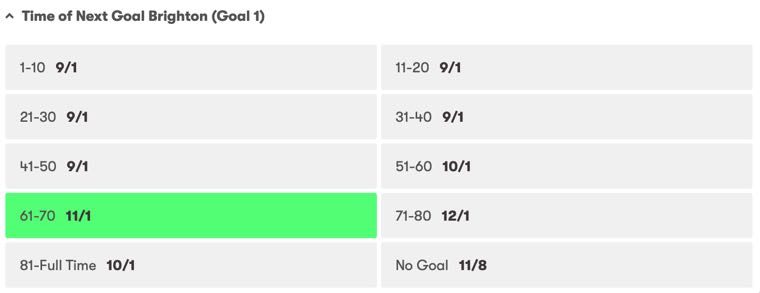 When it comes to betting on football, the more specific you can be with your bets, the more likely you are to get higher odds from your bookmaker of choice. Football is a sport with countless variables influencing the outcome, which is why it is that it is generally quite a low-scoring one.
When it comes to betting on football, the more specific you can be with your bets, the more likely you are to get higher odds from your bookmaker of choice. Football is a sport with countless variables influencing the outcome, which is why it is that it is generally quite a low-scoring one.
There are numerous things that can change and alter the progress of a match, from free-kicks and penalties being given to players being sent off. One of the bets you can place that asks for a degree of specificity is the Goal Time Betting market, which quite literally asks you to predict the time period when a goal will be scored.
Time of First Goal

One of the most simplistic bets to place in terms of how the bet itself works is the Time of First Goal wager. Bookmakers break the match up into chunks, with odds then put in place on the first goal of the game being scored in each specific chunk. If that is when the goal is scored then you obviously win your bet, whilst if it is scored during another time period then your bet will be a loser. Here is how it might look:
- 1-10 minutes – 27/10
- 11-20 minutes – 3/1
- 21-30 minutes – 17/4
- 31-40 minutes – 11/2
- 41-50 minutes – 7/1
- 51-60 minutes – 11/1
- 61-70 minutes – 16/1
- 71-80 minutes – 25/1
- 81-Full-Time – 28/1
- No Score – 11/1
There are two period of time that offer you a longer period in which a goal might be scored than the other sections. The first is the 41-50 bet, given that it includes the end of the first-half and any stoppage time that might be played. The second is 81-Full-Time, which also includes the stoppage time played at the end of the game. Whilst it is obviously entirely possible that a game remains goalless until the last ten minutes or so, it isn’t particularly likely. That is why the odds tend to be longer, even though you’re getting an extra period of time in which the goal can be scored and your bet will be a winner than the other segments offered.
When it comes to betting on the big leagues around Europe, from the Premier League to the Championship, La Liga to the Bundesliga, there is plenty of information out there on how often teams tend to score their first goal in a game and how often they usually concede their first goal. In other words, you can do a bit of research ahead of a game and look to see what the stats say around the likelihood of a goal being scored during a specific time period in the match that you’re betting on, placing your wager accordingly. Those stats will be there for both the home and away fixtures, as well as overall.
Time of Next Goal
It isn’t much of a surprise to learn that bookmakers are also more than happy to offer you odds on the Time of the Next Goal on the In-Play market. It works in the same way as the Time of First Goal market, with the options decreasing as time passes. This is such a volatile market that it is one that is difficult to predict, which is why the odds can often be favourable towards the punter. The problem, of course, is that the bet can be lost in a matter of seconds, given the speed with which teams can score goals in a game.
If you’re looking at placing a bet on the Time of Next Goal market then the same research that you would do for the Time of First Goal betting still applies. Obviously goals can come out of nowhere, but teams do tend to have ways of playing that mean that they will be building towards the opportunity to score a goal. This is why the average time of a team’s first goal scored, first goal conceded and first goal overall is such a helpful stat, giving you a sense of how likely a side is to score the next goal in a game even if one has already been scored. That is especially the case if a team has conceded.
That is to say, if a team has conceded a goal to the opposition then the information around what time they usually score their first goal will still be valid. That being said, the game-state will have changed and teams perform differently under various pressures. Some teams are more likely to score having conceded a goal, whilst others are more likely to concede again. The ways in which football matches change depending on what has happened is something that you need to bear in mind before placing your bets.
